Unit 9 翻译中视角的转移
汉英翻译中的视角转换
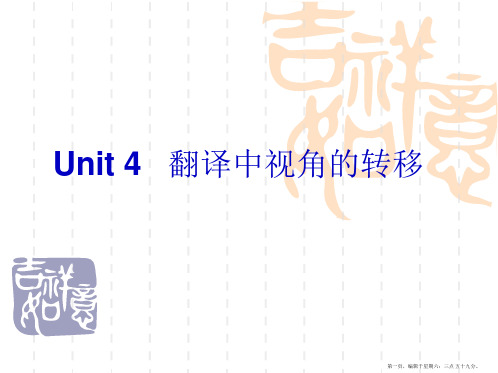
第十七页,编辑于星期六:三点 五十九分。
▪ 反说法 (用英语形式上否定的英语词表 达汉语肯定的意义)
▪ 1. 他这学期全勤。
▪ He has never missed a class this semester.
第六页,编辑于星期六:三点 五十九分。
▪ 3. 他看了看桌上的点心,摇了摇头, 一点也不吃。
▪ He ran his eyes over the refreshments on the table but shook his head and refused to touch anything.
第七页,编辑于星期六:三点 五十九分。
第十一页,编辑于星期六:三点 五十九分。
▪4. 欲速则不达。
▪More haste, less speed. ▪Haste makes waste. ▪Haste brings no success.
第十二页,编辑于星期六:三点 五十九分。
▪ 副词或副词短语: little, otherwise, too…to.. etc.
▪ 表否定语气的名词:absence, failure, refusal, ignorance, neglect, exclusion etc.
▪ 1. 司机开车时,千万不能心不在焉。
▪ A driver’s absence of mind is absolutely forbidden.
▪ 2. 我们完全不知道他的计划。 ▪ We are in complete ignorance of his plan.
英汉翻译――视角转换PPT课件

cannot be determined by a study of the surface.
10
英汉语主动与被动的比较:
英汉语态使用的比较:
(B)汉语则很少使用被动语态,即使用,也不像英 语那样有统一,固定的构成形式。主要有两种表现形 式:一种是含有“被,受,挨,遭,给,为,让”等 字样; 而大多数情况下,是采用第二种,用主动态表 达被动含义。如:“飞鸟尽,良弓藏;狡兔死,走狗 烹”。因此,在英汉互译中,常常要变换语态。
research group. 计划将先由研究小组加以研究。
13
英译汉中被动句的处理
三、译成汉语主动句 1 形式上是主动句,表达被动意义 The whole country was armed in a few days. 几天以内,全国就武装起来了。 Another middle school has been set up in our
现代生活中所有的东西都受时尚的影响。 Almost nothing in modern life escapes the
influence of fashion.
7
含否定意义的英语表达法
英语表达否定意义除了通过使用一些明显表示 否定意义的副词和连接词以外,英语里还有大 量的短语或搭配暗含否定意义,如“far from, other than”等。在翻译时,灵活使用这些表达, 可以使语言更灵活地道。
11
英译汉中被动句的处理
一、译成汉语被动句 1. The window pane was broken by the child.
窗上玻璃被这小孩打碎了。 2.North China was hit by an unexpected heavy
英汉汉英视译教程上篇英译汉第九单元 的的结果句视译-文档资料

第9单元 结果句视译 (例段)
2. Another sensible proposal, embraced by President 另一项合理的银行税提案得到奥巴马总统和诸多
Obama and a number of international experts, is the 国际知名专家的支持,
第9单元 结果句视译 (要点梳理)
此单元所列是广义上,而非仅语法层面的结果句 各种语言因果颠倒的现象层出不穷 不同语言在相同或相近因果语境中的思维侧重或 方式的不同造成了思维转换障碍 视译原文:书面化语言居多, 视译译文:或是书面化,或是口语化,或是半口 语半书面化语言 翻译时在因果关系上采取“抓小放大”的办法, 即侧重原文细节, 淡化原文宏观链接
第9单元 结果句视译 (例段)
原文中的结果链接词语so that 在视译中 〈译评〉 翻译成“一旦开征”,遵从了汉语的表 达习惯。汉语中无论是原因还是条件, 只要结构复杂冗长,在表达结果前有时 需要对原因或条件进行缩略式重复,既 获得了逻辑更紧密的语义链接, 也收到 了承前启后的语言符号链接效果。
province since 2007. But Ma has faced some 但是在开办纪念堂的过程 problems in running the memorial hall, 中,马先生遇到了若干问题。
第9单元 结果句视译 (例段)
and as he spends most of his time and energy
【视译】 关于这个问题,不同的意见都已经得到 陈述,因此现在请大家表决。第9元 结果句视译 (例句)
〈译评〉 笔译版本在很大程度上保留了英文的思 维方式,译文听着费解,甚至困惑。视 译版本抛开了英语思维方式,更多地兼 顾汉语思维方式和习惯,所以译文更易 懂、流畅。
Unit 9 Kids and Computers Digital Danger 课文翻译
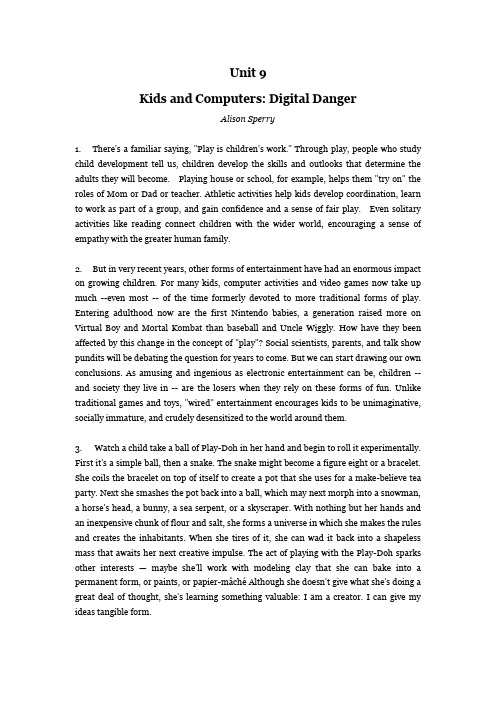
Unit 9Kids and Computers: Digital DangerAlison Sperry1. There's a familiar saying, "Play is children's work." Through play, people who study child development tell us, children develop the skills and outlooks that determine the adults they will become. Playing house or school, for example, helps them "try on" the roles of Mom or Dad or teacher. Athletic activities help kids develop coordination, learn to work as part of a group, and gain confidence and a sense of fair play. Even solitary activities like reading connect children with the wider world, encouraging a sense of empathy with the greater human family.2. But in very recent years, other forms of entertainment have had an enormous impact on growing children. For many kids, computer activities and video games now take up much --even most -- of the time formerly devoted to more traditional forms of play. Entering adulthood now are the first Nintendo babies, a generation raised more on Virtual Boy and Mortal Kombat than baseball and Uncle Wiggly. How have they been affected by this change in the concept of "play"? Social scientists, parents, and talk show pundits will be debating the question for years to come. But we can start drawing our own conclusions. As amusing and ingenious as electronic entertainment can be, children -- and society they live in -- are the losers when they rely on these forms of fun. Unlike traditional games and toys, "wired" entertainment encourages kids to be unimaginative, socially immature, and crudely desensitized to the world around them.3. Watch a child take a ball of Play-Doh in her hand and begin to roll it experimentally. First it's a simple ball, then a snake. The snake might become a figure eight or a bracelet. She coils the bracelet on top of itself to create a pot that she uses for a make-believe tea party. Next she smashes the pot back into a ball, which may next morph into a snowman, a horse's head, a bunny, a sea serpent, or a skyscraper. With nothing but her hands and an inexpensive chunk of flour and salt, she forms a universe in which she makes the rules and creates the inhabitants. When she tires of it, she can wad it back into a shapeless mass that awaits her next creative impulse. The act of playing with the Play-Doh sparks other interests —maybe she'll work with modeling clay that she can bake into a permanent form, or paints, or papier-mâché Although she doesn't give what she's doing a great deal of thought, she's learning something valuable: I am a creator. I can give my ideas tangible form.4. A video game, on the other hand, is cynically programmed to give the illusion of creativity. The player is given various choices at every turn —Which door will I go through? Which weapon will I use? What clue shall I read? — But they are choices in the same sense that a pigeon's pecking at a lever to get a grain of corn is a choice. The player is as much a tool of the game as the joystick. Her momentary fun is unsatisfying because it leads not to any genuine sense of achievement but only to the hypnotic experience of watching someone else's creation unfold. Hand a ball of Play-Doh to a child reared on the sterile adventure of video games, and you're apt to get a blank look and the hesitant question, "What do I do with it?" The video game player learns her own lesson: I don't create. I let someone else's creativity happen in front of me.5. It's a beautiful Saturday in autumn, and a group of kids are playing a pickup game of soccer. A dispute arises about whether a kick went over the foul line. Some of the kids are sure it did; others insist that it did not. Voices are raised; tempers flare. Maybe a hothead or two will stalk off the field. But the sky is crystal blue, and there are chores waiting at home. Making a quick calculation about the relative benefits of continuing the game, the players work out a solution. Maybe they replay the kick. Maybe they flip a coin. Maybe they agree to say that the ball was fair, or foul. Their willingness to compromise, to accept the idea that such give-and-take is part of life, allows the game to proceed. The players move on, having learned a small lesson about getting along with others.6. Contrast that scene with the world of the Internet chat rooms, where many adolescents spend uncountable hours. On that same lovely Saturday, a young Internet queen hunches over her keyboard, alone in her room. Her buddy list includes dozens, even scores, of "friends" she's never met. Her fingers fly across the keyboard as she races from one dialogue box to another, keeping up multiple conversations. These are peculiar conversations, however, including none of the vulnerability that is part of real-world friendship. In the buddy-chat world, status is based on the ability to keep up a rapid pace of one-liners, insulting zingers, caustic put-downs. The chat queen's most intimate friendships take the form of brief alliances with buddies who join with her to "flame" another chatter who has displeased them. If that ally eventually becomes annoying, too, zap! She can instantaneously erase him from her buddy list, or even block him so he is unable to contact her again. It's no great loss. There are literally millions of new acquaintances waiting to be picked up in a chat room to fill that void. The lesson: I shouldn't have to work at relationships. They come and go instantly and at my convenience. If someone displeases me, I can make that person disappear.7. When kids sit down to play Monopoly, they form a loosely knit group that is still part of the world around it. When company arrives at the house, it's no problem to halt thegame briefly. The players can greet visitors, laugh together, talk about the game, even quickly rearrange it to include new players. Even after the game continues, chatting with other players and non-players is easily accomplished. Despite their involvement in the game, the players are not ruled by it. Human contact, courtesy, and communication are not seen as threats to their enjoyment. They are learning that they can enjoy their own activities and still be sensitive to the larger world around them.8. Contrast this board game scene with one that has become depressingly familiar in many living rooms. Visitors arrive at a home to find a child hunched in front of the TV set, video controls in his lap. Even when spoken to directly, he does not pull his eyes from the screen. "I'm playing!" is his furious response if the visitors persist in trying to engage his attention. Far too often, even his parents, intimidated by the high-priced, high-tech gadget that has sucked their child's humanity away, tiptoe around rather than disturb him. The game itself is all too likely to be one that presents the most hideous suffering as entertainment, with the player in the role of psychotic killer -- maybe in Duke Nukem, with its "twenty-three levels of nonstop carnage!" or Bloody Roar, which offers the player "more ways to maim, crush, and devour your enemies than ever."9. The lesson?10. Isn't it too awful to think about?1. 有一句众人皆知的俗语:“玩是孩子们的工作。
英语翻译――视角转换PPT课件
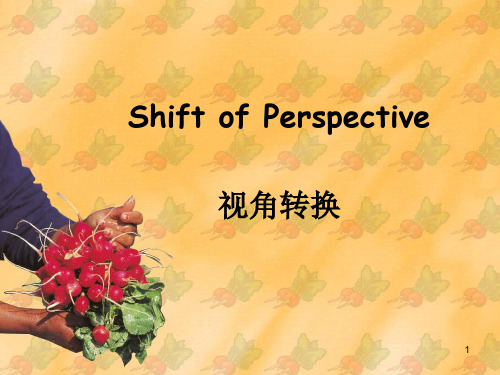
16
• 当人们游览桂林时,那些自然景观和人 文景观,总能令人惊叹并且深思。
• When people travel in Guilin, those scenic and cultural attractions can always impress them and make them think.
11
• 您先请。 • You first. • After you.
12
• 我不是故意的。 • I didn't do it on purpose. • It was an accident.
13
• 人们可以乘飞机、坐火车、走高速 来桂林。
• People can come to Guilin by plane, train and expressway.
• In the dense groves wild monkeys are oftern seen to appear and disappear.
28
结束语
当你尽了自己的最大努力时,失败也是伟大的, 所以不要放弃,坚持就是正确的。
When You Do Your Best, Failure Is Great, So Don'T Give Up, Stick To The End
• The hills and waters come alive with the sound of music during the annual Zhuang Folk Song Festival.
15
• 您可以24小时随时下榻我们酒店。
翻译中视角的转换教学目的使学生很好地了解并掌握翻译
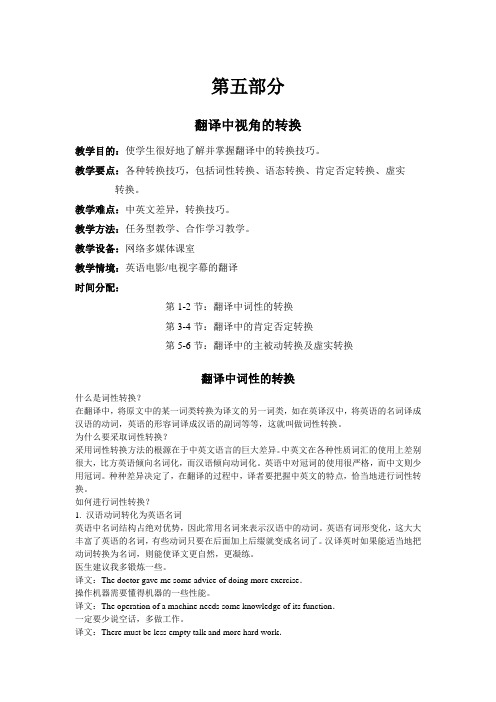
第五部分翻译中视角的转换教学目的:使学生很好地了解并掌握翻译中的转换技巧。
教学要点:各种转换技巧,包括词性转换、语态转换、肯定否定转换、虚实转换。
教学难点:中英文差异,转换技巧。
教学方法:任务型教学、合作学习教学。
教学设备:网络多媒体课室教学情境:英语电影/电视字幕的翻译时间分配:第1-2节:翻译中词性的转换第3-4节:翻译中的肯定否定转换第5-6节:翻译中的主被动转换及虚实转换翻译中词性的转换什么是词性转换?在翻译中,将原文中的某一词类转换为译文的另一词类,如在英译汉中,将英语的名词译成汉语的动词,英语的形容词译成汉语的副词等等,这就叫做词性转换。
为什么要采取词性转换?采用词性转换方法的根源在于中英文语言的巨大差异。
中英文在各种性质词汇的使用上差别很大,比方英语倾向名词化,而汉语倾向动词化。
英语中对冠词的使用很严格,而中文则少用冠词。
种种差异决定了,在翻译的过程中,译者要把握中英文的特点,恰当地进行词性转换。
如何进行词性转换?1. 汉语动词转化为英语名词英语中名词结构占绝对优势,因此常用名词来表示汉语中的动词。
英语有词形变化,这大大丰富了英语的名词,有些动词只要在后面加上后缀就变成名词了。
汉译英时如果能适当地把动词转换为名词,则能使译文更自然,更凝练。
医生建议我多锻炼一些。
译文:The doctor gave me some advice of doing more exercise.操作机器需要懂得机器的一些性能。
译文:The operation of a machine needs some knowledge of its function.一定要少说空话,多做工作。
译文:There must be less empty talk and more hard work.人口在不断地增加。
译文:There is a steady increase in population.2.汉语动词译为英语介词或介词短语英语中介词数量多,搭配灵活,意义丰富。
商务英语翻译 Unit 9
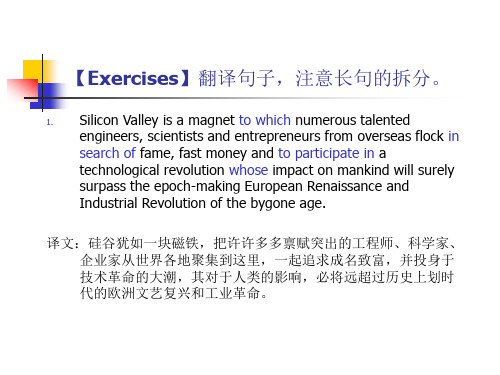
译文:毫无疑问,我们还必须作出更大的努力来对抗全 球变暖的威胁,这个威胁最能清楚地体现各国的 命运是如何紧紧相连的。
5. This Contract is made by and between the Buyer and the Seller, whereby the Buyer agrees to buy and the Seller agrees to sell the under-mentioned commodity according to the terms and conditions stipulated below. 译文:买卖双方同意按下列条款购买、出售下述商品, 并签订本合同。(reduction)
John… preached the baptism of repentance unto the forgiveness of sins.
John preached the message to the people; John baptized the people; The people repented of their sins; God forgave the people their sins; The people sinned. John preached that the people should repent and be baptized so that god would forgive the evil they had done. John preached, ―Repent and be baptized so that God will forgive the evil you have done.‖
译文:我的母亲简· 兰普顿· 克莱门斯88岁才去世。这对于 一位40岁就身体虚弱、被认为痼疾缠身、注定不久于 世的人来说,是难得的高龄。
八下英语第九单元课文翻译

Unit9 SectionA 1部分课文翻译1a部分翻译Wluch of these places would you like to visit? Rank them from l (most) t0 6 (least).这些地方中你想参观哪一处?从1(最想参观)到6(最不想参观)给它们排序。
space museum_____太空博物馆_____history museum_____历史博物馆_____art museum_____美术馆_____water park_____水上公园_____zoo_____动物园_____amusement_____游乐场_____1b部分翻译Listen. Have these students ever been to these places? Check(√)the boxes.听录音。
这些学生曾去过这些地方吗?在方框中用“√”画出来。
1c部分翻译Ask and answer questions about the placesinlb.就1b中的地方进行问答练习。
A:Let's go somewher differ ent today.咱们今天去某个不同的地方吧。
B:OK. Where do you want to go?好的。
你想去哪里?A:Have you ever been to the space museum?你曾经去过太空博物馆吗?B:No,I haven't. How about you?不,我没去过。
你呢?2a部分翻译Look at the map of the town Listen and the places you hear.看这幅城镇地图。
听录音并圈出你所听到的地方。
2b部分翻译Listen again and circle T for true or F false.再听一遍录音,正确的圈T,错误的圈F。
- 1、下载文档前请自行甄别文档内容的完整性,平台不提供额外的编辑、内容补充、找答案等附加服务。
- 2、"仅部分预览"的文档,不可在线预览部分如存在完整性等问题,可反馈申请退款(可完整预览的文档不适用该条件!)。
- 3、如文档侵犯您的权益,请联系客服反馈,我们会尽快为您处理(人工客服工作时间:9:00-18:30)。
• 6) Don’t make your conclusion before the end of the year. • 到年底再下结论吧! • 7) “You will try to tide me over, won’t you?” • “Won’t I!” • 你会帮我度过难关,是吗? • 当然!
• 1) –Hey, it is late. Where is Tom? • ----He’s still in bed. • 他还没有起床。 • 2) Without reasoning one is apt to be beyond control. • 没有理智容易变成不受约束。 • 3)---Are you not going tomorrow? • --- No, I’m not going. • (是的,我不去)
• 3) Both sides thought hat the peace proposal was one they could accept with dignity. • 双方认为,那是一个他们可以不失体面地接受 的和平建议。 • 4) She would rather have her room painted milk-white than have it painted sky-blue. • 她宁可把房间漆成乳白色,也不愿漆 成天蓝色。
• 7) The subversion attempts proved predictably futile. • 不出所料,颠覆活动证明毫无效果。 • 8)Arguing from the view that humans are different from animals in every relevant respect, extremists of this kind think that animals lie outside the area of moral choice. • 极端主义者认为,人与动物在各方面都不 同,对动物无需考虑道德问题。
• 4. 原文形式上双重否定,就相当于肯定, 翻译时需要表达肯定的意义。 • 1) There can be no sunshine without shadow. • 有阳光就有阴影。 • 2) You can’t buy things without money. • 没有钱就买不到东西(有钱才能买东西)。 • 3) He was nothing if not a hypocrite. • 他完全是个虚伪的人。
• 4)If he had kept his temper, the negotiation would probably have been a success. • 要是他没发脾气,谈判很可能已经成功了。 5) The explanation is pretty thin. • 这个解释相当不充实。 • 6)I’m at my wits end to keep the children quiet. • 我实在没办法让这些孩子安静下来。
• 听到这个有趣的故事,她情不自禁的笑了。 • 3) It will not be long before we • 我们很快就会在见面。
• 6. 带有“all”的不完全否定句,翻译时要格外 小心: • 1)All that glitters is not gold. • 发光的并不都是金子。 • 2) All criminals are not murderers. • 罪犯并非全是杀人犯。 • 3) But all men are not born to reign. • 并非人人生来就是作帝王的。 • 4) Both children are not clever. • 并非两个孩子都聪明。
• 4)He manifested a strong dislike for his father’s business. • 他对他父亲的行业表示了强烈的厌恶 情绪。 • 5) He was an indecisive sort of person and always capricious. • 他这个人优柔寡断,而且总是反复无 常。
• 4) The evidence is conclusive, excluding all possibilities of doubt. • 5) You should seize the opportune moment to put in a good word for me.
ห้องสมุดไป่ตู้
Key:
• 1) 吹捧你的人并非都是你忠实的朋友。 • 2)怀特先生没有对那国的政变发表官方 (正式)评论。 • 3)那件事没有削弱我们的决心,反而增强 了我们的决心。 • 4)证据确凿,毋庸置疑。 • 5) 你应该不失时机的为我说情(好话)。
• 4) “You are too beautiful and gifted not to make me fall in love with you!” • “你太美丽太多才了,我怎能不爱你!” • 5) There is not any advantage without disadvantage. • 有利必有弊。 • 6)There is no story without coincidence. • 无巧不成书。
Unit 9 翻译中视角的转移
• 教学目的: 英语和汉语都有从正面和反面来表达某 种概念现象。正说反说作为一种翻译技巧, 主要是指在翻译实践中,为了使译文忠实、 通顺而又合乎译入语表达习惯地传达原文的 意思,有时需要把原文中肯定或否定的说法 进行适当调整。 本讲的主要目的是让大家体会这种翻译 技巧在实践中的用法并能初步掌握它,准确 的处理类似的问题。
•正反翻译课后阅读:
•英语翻译中的反译法 •文学翻译中的文化传达与读者
•译者的诞生与原作者的“死亡”
• 9)Everybody was waiting for her but she was talking to Ms. Zhang while slowly walking out of her classroom. • 人人都在等她,而她却一边同张老师说话, 一边不紧不慢(不慌不忙)地走出教室。 • 10) Miss Mary kept to her room all day. • 玛丽成天足不出户。
exercises: • 1)All that flatter you too much are not faithful friends. • 2) Mr. White has refrained from making an official comment on the coup in that country. • 3) That served to strengthen instead of weaken our determination.
• 5. 原文含有否定形式的惯用语时,要根据实际情况进 行翻译:
• 1) You can’t be too careful when you drive a car. • 开车时怎么小心也不为过。 • 开车时,越小心越好。 • 2) She can’t help laughing when
she heard the funny story. meet again.
• 11) It’s a long time since I enjoyed myself so much. • 好长时间没这么痛快地玩了。 • 12) His explanation is far from being satisfactory. • 他的解释远不能让人满意。
• 2. 原文形式否定,译文形式采用肯定: • 1)I don’t doubt China will be reunited. • 我相信中国会统一的。 • 2)He never spared himself and so he made me work hard. • 他总是拼命干,也让我拼命干。 • 3)Hitler’s undisguised effort to persecute the Jews met with worldwide condemnation. • 希特勒对犹太人的露骨迫害行为遭到世界 人民的谴责。
• 1.原文形式上为肯定,译文形式上采用否 定。 • 1)Such a chance was denied me. • 我没有得到这样一个机会。 • 2)The first bombs missed the target. • 第一批炸弹没有击中目标。 • 3)While colder than usual, the weather held. • 尽管较平常冷些,天气(保持)没变。
• 3. 原文形式上为肯定、意义上为否定, 翻译时可以直接表达出暗含的否定意义。 • 1) It was more than I could bear. • 这个我不能忍受。 • 2) The guerrillas would fight to death before they surrendered. • 游击队员宁愿战斗到死,也决不投降。
• 5) In addition to providing a cool sitting place in the open air, a balcony can also protect the window below from the direct glare of the sun. • 阳台除了可供人们乘凉以外,还可以保护 下面的窗户,使它不受到阳光的直接照射。 • 6) The last thing I want in this world is to hurt you. • 这个世界上我最不愿意做的是就是伤害你。
